#étienne volant
Explore tagged Tumblr posts
Text
Here is a continuation of the family tree collaboration project with @konstantynowitz. Originally, my main focus was on the Rosier family, but before we get into that side of the tree, I'm going to introduce you to earlier generations of the Volants. I have been connected to the French branch of the Lestrange family through a Volant ancestor, and this might be a long shot, but just bear with me. Benouét Volant was born in 1794 as the nephew of Jodelle Lestrange (née Volant) who married Floxel Lestrange. In the year 1782, Jodelle had one daughter with her husband: Quintilla Lestrange, the mother of Nozéa Lestrange. Benouét was taken in by his aunt and uncle as a child when his parents died of a dragon pox outbreak. He was raised by Jodelle and Floxel, growing up alongside Quintilla as if she were his elder sister. Benouét later named his son Floxel Volant (I) in honor of his uncle.

For the time being, I do not have a name for Benouét's spouse, but I suspect that I'll make her a close relative of Floxel maybe through his mother Luminosa. Floxel Volant's mother may be a descendant from the Trouche family as I'm sure Benouét must've interacted with his uncle's extended family growing up, perhaps developing a close relationship with a potential bride through the Trouches.
I believe that Jodelle would have arranged for Benouét to marry a relative of her husband so that he could stay closely connected with the family. Floxel and Jodelle cared for Benouét as if he were their own child, so I think they thought that marrying him off to a Trouche was almost like an affectionate way of officially recognizing their nephew as an adoptive son of sorts.

Floxel Volant (I) was born in 1826 to Benouét Volant and his wife, his father was thirty-two at the time of his birth. Floxel remained a bachelor for the majority of his adulthood, enjoying the luxuries and privileges of his family's wealth. He was quite the lady-killer in his youth, so if he did have any children they'd be unacknowledged bastards that he never involved himself with, even if he was aware of their existence. Within the year 1870, at the age of forty-four, an unmarried Floxel impregnated his young mistress at the time, but the only difference between his current mistress and his mistresses of the past was that she also came from an influential French pure-blood family. Because of this, Floxel would be forced to marry his mistress who would later give birth to their only son Étienne Volant.
Something that needs to be acknowledged: I cannot take credit for this next half of the tree, as I had the help of @lazyreinelle when coming up with the backgrounds and names of the characters about to be mentioned. Of course, I've made a few little tweaks of my own when it comes to birth dates and certain aspects of their backstories, but really it is all thanks to the creative mind of @lazyreinelle that I was able to fill in the blanks of the tree.
Étienne Volant was born in 1870 and married Clotilde de Trefle-Picques, a seemingly mild-mannered girl, yet popular because of her family. She is betrothed off to Étienne during her penultimate year at Beauxbatons. Despite being ten years her senior, Étienne often acted like a man-child and was incredibly irresponsible. So, when it came to raising children, he would mostly never be around, goofing around in bars or sleeping with any veela he met. Clotilde had to raise her children: an elder daughter Eglantine (b. 1904), and two younger twin sons Floxel (II) and Claude (b. 1906), all by herself naturally instilling them with rather harsh views of blood purity.
In spite of his absence, Étienne was closest to his daughter Eglantine, who inherited his free-spirit, although it was much more reigned in than her father's was. Even so, she was frequently challenging authority and diving headfirst into escapades that left her mother exasperated. Clotilde always cursed her husband for passing on such a wild spirit to Eglantine, wishing instead that their daughter possessed a more measured temperament that would ease her worries and keep her out of trouble. Eglantine did not want to follow the expected societal norms for young witches of the time, nor did she wish to conform to the wishes and expectations of a future spouse, believing that her personal freedoms should be valued if she were to find herself married one day. Eglantine Volant harbored a fondness for her father, as he was the only one who could ever understand her. He never saw her as being unreasonable when voicing her standards for a hypothetical husband. Clotilde always believed that her daughter was being ridiculous when forming these ideas of a marriage of compromise, dismissing them as fanciful daydreams. Whenever Étienne was around he'd spoil his little daughter with small gifts and let her skip piano lessons or her early homeschooling to spend time "adventuring" with him on the estate's property. She grew up knowing that her father was not a dependable man, but that did not make him a bad parent to his children, at least during the times he occasionally visited them.

The Volants were deeply in debt because of Étienne's tendencies to gamble away a lot of his inheritance at the bars he frequented at. Clotilde, who came from a family who specialized in concealment charms, was able to hide the decline in the Volant's wealth by casting mirages that could make a simple lump of coal appear to be a bar of gold or some type of jewel. These charms especially helped in regard to paying off Étienne's debts, often conning the people he owed money to with his wife's illusions. Although, after a while, the charm of their fabricated wealth began to wear off and those who Étienne paid his debts to with these charmed objects would find out that they were tricked once the enchantments wore off.
As a result, one night when Étienne was drunk at a bar, he was confronted by one of the men he conned. Étienne was challenged in a magical duel by the man, but ultimately lost and was killed. This is why Clotilde was overjoyed when Eglantine got a proposal from the Rosier family, especially Laurent Rosier. The Rosiers, having already established themselves long back in France, were practically akin to wizarding nobility, matching the Blacks. Eglantine's marriage ensured that the Volants would not go bankrupt and reinstated stability within the family.
Featured at the top, is a tree which connects the Rosier family to the French branch of the Lestrange family. As I mentioned in my first post for the tree, Laurent Rosier is the great-great-nephew of Minette Rosier, making him third cousins with Leta Lestrange and her younger half-brother Corvus V. In addition to this, Laurent's father was first cousins with Fèlicule Lestrange (née Rosier), also known as F. Lestrange, the grandmother of Radolphus Lestrange II.

To give you guys a little bit more background of Clotilde Volant (née de Trefle-Picques), she was born to Adélard Duc de Trefle-Picques, a descendant of Vincent Duc de Trefle-Picques, a French nobleman and wizard active around the time of the French Revolution. Her mother was originally introduced as Faustine Escoffier-Floquet, but I changed my mind and renamed her as Touènette de Trefle-Picques (née Beaufort). There is not much I have to tell you about them right now, but soon I will post another update on this tree and hopefully by that time I'll have a little more to share on them. As for their grandsons, Eglantine's younger brothers that were created by @lazyreinelle: Floxel II and Claude Volant, I do have a bit more to share about them.
Floxel Volant II married Pascaline Volant (née Perrott), a classmate of his elder sister during her years at Beauxbatons. Floxel had a few children with Pascaline, namely their daughter Ghislaine Volant. There are a few more which I will be sharing in the near future, but right now Ghislaine is the only one who will be mentioned at the moment since the other children have more expanded and complex trees in regard to their future descendants.
Before Floxel's marriage to Pascaline, Clotilde started to be a lot more harsh with him, scrutinizing every move of his, and forcibly making him meet potential brides for him yet not allowing him to choose. The Volant heir longed to be free like his twin, Claude without any worry in the world, without someone constantly breathing down your neck. Being the older twin by five minutes was perhaps the only thing Floxel could uphold Claude over. The younger had all the other luxuries to bed, flirt with any one he liked, regardless of blood-status. As the second son, Claude was the spare and therefore didn't have as much responsibility to the family. Claude could often cross the line, becoming even worse than his father Étienne.
Claude Volant was notorious for philandering about, oftentimes bedding attractive veela ballerinas. He would later be disowned by his family for impregnating his veela mistress, leading to a bitter estrangement that would cause him to lose contact with his elder sister and twin brother.
Well, that's it for now! The next post I make will probably be more focused on the Rosier-Volant descendants, and maybe I'll give a little more insight on the Rosier family itself, especially Laurent and Vinda Rosier's parents.
#family trees#collaboration project#druella rosier#eglantine rosier#eglantine volant#druella black#evan rosier#felix rosier#etienne rosier#étienne volant#claude volant#floxel volant ii#floxel volant i#minette rosier ii#minette rosier i#minette lestrange#floxel lestrange#jodelle volant#pascaline perrott#clotilde volant#clotilde de Trefle-Picques#laurent rosier#quintilla lestrange#lestrange family#fèlicule rosier
27 notes
·
View notes
Text
Family tree revisions - Lestrange & Volant
There has been a significant change in birth years for the Lestrange-Volant family tree as @harbinger-0f-spring and I have seemed to miscalculated a few generations! Sorry for the misunderstanding but hopefully we've cleaned a few things up with this revision I've made. I can't promise that there won't be any errors, although what I came up with seems to somewhat align with each generation.

First off, I've gotten rid of Benouét Volant as we found that he was born way too early to be a cousin of Quintilla Lestrange (I have also taken the time to change her date of birth as well). I don't know if we'll be using the name Benouét for a Volant relative we come up with in the near future, but it is a possibility that we will be reintroducing Benouét Volant as Étienne's father rather than his grandfather. This would therefore make Benouét the elder brother of Jodelle Lestrange (née Volant), since the date of birth I've made up for her would make her a bit younger. Instead of 1870 as the original birth date of Étienne Volant, I've changed it to 1873 so that now he is seven years his wife's senior. As for his cousin Quintilla who @harbinger-0f-spring made the elder cousin of Benouét Volant, I put her date of birth around 1893. With the fixing of the generations and dates, this would make Quintilla quite young compared to Étienne, about twenty years to be exact. I'm sticking to the storyline which we had planned out for Benouét that his parents died during a dragon pox outbreak, but instead of Benouét I replaced him with Étienne.
Étienne was ten in 1883 when the dragon pox outbreak occurred and his young aunt Jodelle (aged 19), who was newly married, took in her orphaned nephew and raised him alongside her husband Floxel (aged 27). This all happened years before Jodelle and Floxel had their daughter Quintilla so Étienne was basically their first child at the time. When Étienne grew up and married, he named his eldest son Floxel Volant in honor of his uncle.
#volant family#rosier family#lestrange family#floxel volant#family tree#collaboration project#family tree revisions#etienne rosier#étienne volant#quintilla lestrange#benouét volant#jodelle volant#floxel lestrange#clotilde volant
14 notes
·
View notes
Text
B. 1902 — Ségolène Leroy (née Volant) married Marceau Leroy, a distant nephew of the Leroy sisters Balbine and Pucine. She was married to him at the age of sixteen, while her husband was seventeen at the time. Their early marriage was an arranged one, the two having not been very well-acquainted with each other even once Ségolène was given away to Marceau at the altar. The union was an asset to the Volants who were succumbing to financial ruin after the death of Étienne Volant, the family depending on Ségolène as the eldest of her sisters to stabilize their fortune.
Marceau was a charming man with a magnetic personality that drew people in effortlessly. His warm smile and genuine interest in others made him a beloved figure amongst his family and fellow pure-bloods. Ségolène, who was more soft-spoken and not as outgoing or assertive, found herself captivated by his charisma from their very first meeting; Marceau had a way of making her feel valued and heard, which was refreshing for the girl, for she finally felt she could express herself without reservation knowing that her opinions mattered to someone and would not go overlooked.
In spite of not having a say in whether or not she wanted to marry Leroy, Ségolène approached her situation with a quiet resolve. The decision had been made by her parents, who let their daughter’s thoughts and opinions go unheard, especially since she was the eldest child and had an obligation to her family’s honor and reputation. Even so, Ségolène would be the most fortunate of her sisters to have married Marceau as her union with him blossomed into a long-lasting partnership filled with love and happiness that would not be short-lived, nor strained and loveless.
Ségolène and Marceau had two daughters: Capucine (b. 1925) and Odelette Leroy (b. 1927)
B. 1905 — Orphélie Malfoy (née Volant) married Brutus Malfoy II, a distinguished scion of one of the oldest pure-blood families in the wizarding world. Their union was not just a romantic commitment but a strategic alliance, strengthening ties between two influential families. The second eldest Volant daughter, known for her striking looks and sharp intellect, was a rising star in the circles of high society. Orphélie captivated many with her wit and charm, her marriage to the young Malfoy heir attracting much attention from the public who were enchanted by the foreign French witch.
She was a breath of fresh air to the snobbish and traditional Malfoy family, who had long been steeped in the rigid customs of pure-blood society. Orphélie’s vibrant personality and modern outlook challenged the status quo, introducing her liberal approach to more progressive views. Although her in-laws weren’t so agreeable with her ideas, Brutus remained supportive of his undeterred wife, remaining by her side in spite of his family’s beliefs.
At the age of 21, only two years into her blissful marriage with Brutus, young Orphélie tragically passed away from illness, leaving her distraught husband to become cold and bitter the day her body entered the Malfoy family crypt. With no heirs, Brutus was forced to remarry, although his second wife could not hold a candle to the beautiful and spirited Orphélie. The contrast was stark; while his new wife, a dutiful and traditional woman, embodied the expectations of pure-blood society, she lacked the warmth and vibrancy that defined his first marriage. Brutus felt trapped in a gilded cage, haunted by memories of the laughter and joy that had once filled Malfoy manor from when his late beloved wife was still alive.
B. 1907 — Adélaïse Nott (née Volant) was a professional ballerina and mistress of Cantankerous Nott, a callous man who was notorious for his bitterness and sharp temper. No one ever thought a someone filled with so much hatred could ever be capable of love, especially when it came to loving someone so delicate and innocent as Adélaïse Volant, who with her beauty and grace, somehow managed to capture the cruel man’s eye during one of her performances while touring in England.
There was a major scandal when an unmarried Adélaïse found out she was pregnant with Nott’s baby—a little boy. The two were in a relationship for about two years around the time the young Volant girl found she was with child. The relationship between Cantankerous and Adélaïse was not a secret to the public since the beginning, so it didn’t take long for people to find out. The news of Adélaïse’s pregnancy sent shockwaves to society and the Volants were urging for Cantankerous to marry the girl for her reputation’s sake.
Reluctantly, Nott married Adélaïse to spare her from public shame. Although he cared for her, admitting that he wished to be married to her would be a lie. He cherished the relationship they had before marriage—its freedom and lack of commitment. He had always preferred to keep people at arm's length, avoiding the emotional entanglements that came with deep connections. Their love for each other would become strained, especially as the child grew and Cantankerous became harsher towards his son.
The Volant sisters and their children are ocs of @konstantynowitz who has gone on a little hiatus and has asked me to post about these characters. The husbands of Ségolène Leroy and Orphélie Malfoy are original characters of mine.
#ségolène leroy#ségolène volant#orphélie malfoy#orphélie volant#adélaïse volant#adélaïse nott#marceau leroy#brutus malfoy ii#capucine leroy#odelette leroy#cantankerous nott#my ocs#ocs#riddle era
18 notes
·
View notes
Text
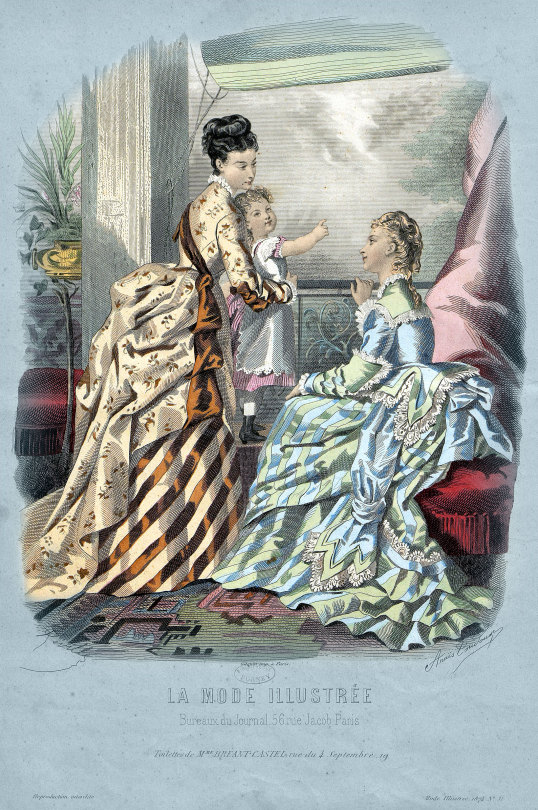
La Mode illustrée, no. 31, 2 août 1874, Paris. Toilettes de Mme Bréant-Castel, rue du 4 Septembre, 19. Ville de Paris / Bibliothèque Forney
Jupon en foulard écru uni couvert de rubans en velours de Saint-Étienne marron, disposés en rayures diagonales. Polonaise-princesse sans aucune garniture, en foulard écru, avec semé de bouquets marron. Une écharpe en ruban marron est fixée sur l'épaule gauche, traverse le dos, et relève le côté de droite de la tunique en y formant trois plis très-considérables; manches pareilles à la tunique jusqu'aux coudes. Depuis le coude jusqu'aux poignets les manches sont pareilles au jupon.
Jupon en faye à rayures vert-réséda très-pâle et bleu très-pâle. Le jupon est coupé de telle sorte que les rayures soient en biais; les lés de derrière sont droit fil, mais garnis de deux volants étroits, coupés en biais, surmontés d'un biais bleu pâle, lequel est surmonté d'une guipure blanche. La tunique (droit fil) n'a aucune garniture; elle est relevée par derrière sous un nœud bleu pâle. Corsage en faye bleu pâle uni, avec basques bordées d'un biais réséda et d'une guipure blanche. Grand col marin réséda avec guipure blanche; manches bleu uni avec revers réséda garni de guipure, s'arrêtant en-dessous du coude. Ces manches sont complétées par une manchette formée d'un poignet et de trois volants en faye rayée.
—
Plain ecru foulard petticoat covered with brown Saint-Étienne velvet ribbons, arranged in diagonal stripes. Princess polonaise without any trimmings, in ecru foulard, with semé of brown bouquets. A brown ribbon sash is fixed on the left shoulder, crosses the back, and raises the right side of the tunic by forming three very considerable folds there; sleeves similar to the tunic up to the elbows. From the elbow to the wrists the sleeves are like a petticoat.
Faye petticoat with very pale reseda green and very pale blue stripes. The petticoat is cut so that the stripes are on the bias; the back lengths are straight grain, but trimmed with two narrow flounces, cut on the bias, surmounted by a pale blue bias, which is surmounted by a white guipure. The tunic (straight grain) has no trim; it is picked up from behind under a pale blue bow. Bodice in plain pale blue faye, with basques edged with reseda bias and white guipure. Large reseda sailor collar with white guipure; plain blue sleeves with reseda lapel trimmed with guipure, stopping below the elbow. These sleeves are completed by a cuff made up of a cuff and three flounces in striped faye.
#La Mode illustrée#19th century#1870s#1874#on this day#August 2#periodical#fashion#fashion plate#color#description#Forney#dress#Modèles de chez#Madame Bréant-Castel#bustle#stripes#train
38 notes
·
View notes
Text

Contes et légendes
Chaque peuple à son univers fantastique et mystérieux. Le Québec n'y fait pas exception. D'une région à l'autre, les contes et légendes nourrissent l'imaginaire et tentent d'expliquer l'inexplicable. Je vous présente aujourd'hui quelques unes de ces histoires.
La chasse-galerie
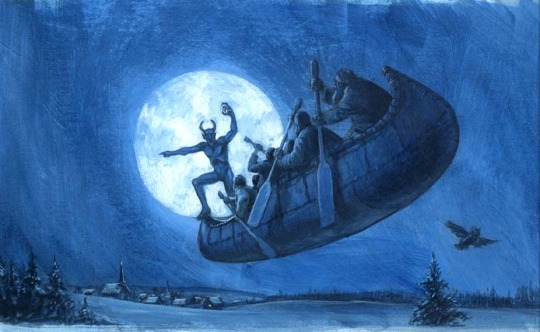
La légende raconte que les bûcherons, éloignez de leur famille dans les chantiers, faisaient des pactes avec Satan afin de pouvoir retrouver leurs proches pour les fêtes de fin d'année. C'est ainsi que, moyennant quelques règles à suivre, le diable fournissait un canot volant permettant aux hommes de passer quelques heures à la maison pour Noël ou la St-Sylvestre.
Mais prenez garde ceux qui tenteraient de déjouer Satan et ne se conformeraient pas aux règles! Votre âme est en jeu dans ce canot maudit!
Ancien maire de Montréal (1885-1887), Honoré Beaugrand écrivit un recueil de contes en 1900: La Chasse-galerie. Claude Dubois, en fit une magnifique chanson.
youtube
Sur un rythme plus folklorique, le groupe La Bottine souriante en a aussi fait une version qui est très populaire dans les partys du jour de l'an (St-Sylvestre).
youtube
Le bonhomme sept heure
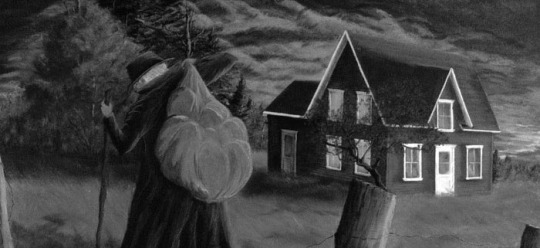
Vagabond effrayant, marchant dans les rues à la tombée de la nuit quettant les enfants désobéissants qui seraient encore dehors ou qui ne dormiraient pas. Vêtu d'une cape, d’un chapeau, d’une canne et d’un grand sac, c'est dans celui-ci qu'il ramasserait les enfants qui ne seraient pas sage. La bonne vieille technique éducative consistant à faire peur aux enfants pour qu'ils arrêtent de faire chier.
C'est un peu l'équivalent québécois du Croque-Mitaine ou du Père Fouettard qui sont totalement inconnus de ce côté de l'Atlantique. Quant aux États-Unis, ils ont le Boogeymen.
La Corriveau
Marie-Josephte Corriveau, mieux connue sous le surnom de « la Corriveau », est l’une des figures les plus populaires du folklore québécois. Une histoire de meurtre qui a un peu dégénéré.
Les faits:
La Corriveau se marie une première fois en 1749. Malchance, quelques années plus tard son mari décède, en 1760. 15 mois plus tard elle se remarie (a niaise pas avec la puck, comme on dit chez nous). Comble de malchance, son 2e mari, Louis Étienne Dodier*, meurt à son tour.
Ça commence un peu à jaser dans le village, si bien qu'une enquête est menée et en 1763, s'ouvre le procès pour meurtre de Joseph Corriveau, le père de Marie-Josephte. Reconnu coupable, il se confessa la veille de son exécution au curé, avouant n'étre que complice après les faits et que la meutrière est en réalité sa fille.
Rebelotte pour le procès et cette fois la Corriveau est déclarée coupable et est condamnée à être pendue, son corps devant ensuite être « hanged in chains » (suspendue en chaines). Ce qui fut fait. Le corps de la jeune femme fut placé dans une cage de fer et suspendu à une intersection de la ville pendant au moins 5 semaines.
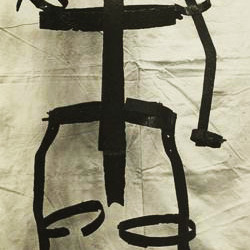
La "cage" fut retrouvée dans un cimetière en 1851 et fut exposée à Québec et Montréal avant d'être vendue à un Américain et exposé d'abord à New York puis à Boston. Longtemps disparue, c'est un historien québécois qui la retrouve en 2011 à Salem, la fait rappatrier et expertisées. En 2015, c'est officiel: il s'agit bien de la cage de la Corriveau! Depuis, elle est conservée au Centre de conservation de Québec.
La légende:
La Corriveau fut décrochée à la demande des citoyens qui, déjà, dérangés par l'odeur commençaient à en avoir marre, mais pas que. Le bruit de la cage qui se balançait au vent, des gémissements dans la nuit, d'étranges événements, une femme qui rôde...
L'imaginaire du peuple transforma la Corriveau en une sorcière. On raconte que son premier mari aurait été empoisonné. Elle rôdait la nuit jetant des malédictions aux gens de la ville. Elle aurait même eu jusqu'à 7 maris selon les versions! Tous très malchanceux.
Sa légende inspira bon nombre d'artistes. Romans, chansons, pièces, télévisions, films, sculptures...
youtube
* Louis Étienne Dodier était le fils de Marie-Thérèse Lebrun dit Carrier qui elle-même était la fille de Noël Bhrem dit Lebrun dit Carrier qui parti à la fin des années 1600 de Boulogne-sur-Mer (Pas-de-Calais) pour s'installer sur l'Île d'Orléans au Québec. Éh ouais! Mon ancêtre :) Je suis de la 9e génération née en Amérique!
3 notes
·
View notes
Text
Un conte pour t'aimer - Cédric Étienne

Toi à ta fenêtre Et moi en bas Toi la Juliette Roméo je suis là Je suis comme Casimodo Fou comme pour Esmeralda À mourir d'amour pour toi Près de ton cœur contre ta peau La blanche neige de ce bois Croquant la pomme dormira Un bisou te réveillera Et ce prince sera moi Je trouverai le soulier Qui ira à ton pied De ta tour libérée Je t'offrirai un palais Sur mon tapis volant Comme Aladin je trouverai Le génie et les 3 souhaits Et pour ton cœur te les offrant Telle une princesse Tu seras ma déesse Comme un dieu qui t'aimera Ma religion tu seras Et dans ce jardin d'éden D'un amour et d'eau fraîche Tout deux on se promène Sans la pomme pour que l'on pêche Read the full article
0 notes
Text
Guarín, ex-Vasco, acerta com Millonarios e volta à Colômbia após mais de 15 anos

Volante, de 34 anos, está sem jogar desde março e sem clube desde setembro, quando deixou a equipe carioca. Contrato com time colombiano é de um ano ando rescindiu com o Vasco, o volante Fredy Guarín foi anunciado pelo Millonarios. O jogador, de 34 anos, volta ao futebol colombiano após mais de 15 anos. Ele assinou contrato por um ano com a equipe de Bogotá, com opção de renovação por mais uma temporada. Guarín está sem jogar desde março, antes da paralisação do futebol devido à pandemia do novo coronavírus. Em 2020, ele fez apenas três jogos pelo Vasco, após uma longa negociação para sua renovação. Depois da retomada das competições, o volante voltou à Colômbia e rescindiu com o time carioca. Initial plugin text Fredy Guarín, ex-volante do Vasco, agora é jogador do Millonarios Reprodução/Millonarios Guarín tem 57 jogos com a seleção colombiana e disputou a Copa do Mundo de 2014. Ele não atua pelos Cafeteros desde 2015. O volante surgiu no Atlético Huila, em 2003, passou pelo Envigado e, em 2005, se transferiu para o Boca Juniors. Depois, o colombiano iniciou a trajetória no futebol europeu. Atuou pelo Saint-Étienne, Porto e Inter de Milão, até chegar no Shanghai Shenhua, da China. Em 2019, foi contratado pelo Vasco. No seu primeiro ano pelo Cruz-Maltino, o colombiano disputou 12 jogos e marcou três gols. Na atual temporada, após longa negociação para permanecer no clube, participou de apenas três partidas. Apesar da curta passagem por São Januário, o jogador tatuou a cruz de malta em seu braço.
The post Guarín, ex-Vasco, acerta com Millonarios e volta à Colômbia após mais de 15 anos first appeared on Esporte no Mundo.
from WordPress https://ift.tt/382DctA via IFTTT
0 notes
Text
PSG diz que Neymar só voltará aos gramados em 2021

O Paris Saint-Germain anunciou neste sábado, 19, que o atacante Neymar, que sofreu uma torção no tornozelo esquerdo no último domingo, 13, ficará fora dos dois últimos jogos da equipe em 2020 e voltará aos gramados apenas no ano que vem. Em um comunicado, o PSG informou que o camisa 10 vem passando por tratamento no centro de treinamentos do clube e não poderá enfrentar o Lille, amanhã, nem o Strasbourg, na próxima quarta-feira. O retorno deverá acontecer em 6 de janeiro, contra o Saint-Étienne.
Leia também

Neymar grava vídeo para garoto de 11 anos que sofreu injúria racial

Messi recebe prêmio por jogo limpo em campo e iniciativas sociais

Raí aceita convite de Casares e ficará no São Paulo até o fim da temporada
Neymar sofreu uma entrada dura do volante Thiago Mendes, do Lyon, durante a derrota do time parisiense por 1 a 0 no Parc des Princes, no último fim de semana, que deixou os comandados do técnico Thomas Tuchel em segundo lugar no Francês, com 31 pontos. O Lille lidera, com 32. Na Liga dos Campeões, o PSG passou aperto, mas garantiu a classificação e a primeira colocação do Grupo H, com 12 pontos. Na próxima fase, os franceses enfrentarão o Barcelona em confrontos marcados para os dias 16 de fevereiro e 10 de março de 2021.
*Com informações da EFE
The post PSG diz que Neymar só voltará aos gramados em 2021 first appeared on Notícias em dia.
from WordPress https://ift.tt/34ssY3K via IFTTT
0 notes
Text
PSG diz que Neymar só voltará aos gramados em 2021

O Paris Saint-Germain anunciou neste sábado, 19, que o atacante Neymar, que sofreu uma torção no tornozelo esquerdo no último domingo, 13, ficará fora dos dois últimos jogos da equipe em 2020 e voltará aos gramados apenas no ano que vem. Em um comunicado, o PSG informou que o camisa 10 vem passando por tratamento no centro de treinamentos do clube e não poderá enfrentar o Lille, amanhã, nem o Strasbourg, na próxima quarta-feira. O retorno deverá acontecer em 6 de janeiro, contra o Saint-Étienne.
Leia também

Neymar grava vídeo para garoto de 11 anos que sofreu injúria racial

Messi recebe prêmio por jogo limpo em campo e iniciativas sociais

Raí aceita convite de Casares e ficará no São Paulo até o fim da temporada
Neymar sofreu uma entrada dura do volante Thiago Mendes, do Lyon, durante a derrota do time parisiense por 1 a 0 no Parc des Princes, no último fim de semana, que deixou os comandados do técnico Thomas Tuchel em segundo lugar no Francês, com 31 pontos. O Lille lidera, com 32. Na Liga dos Campeões, o PSG passou aperto, mas garantiu a classificação e a primeira colocação do Grupo H, com 12 pontos. Na próxima fase, os franceses enfrentarão o Barcelona em confrontos marcados para os dias 16 de fevereiro e 10 de março de 2021.
*Com informações da EFE
The post PSG diz que Neymar só voltará aos gramados em 2021 first appeared on Publicidade SP.
from WordPress https://ift.tt/2WxwB41 via IFTTT
0 notes
Text
UGLY
Il faut que je vous parle de ma peau qui pique tout le temps, de l’odeur qui me rend ivre, des poils qui me tapissent, mais avant tout de ma viande qui pourri. Il faut que je vous parle des hommes qui me forcent à vomir, des femmes qui pleurent dans leurs bras et des enfants qui ne naîtront jamais. Quand tu regardes mes cheveux, des poux éclatent … mais tu es déjà ici alors « might as well » y prendre plaisir. Aucune opinion ne m’aime et c’est bien comme ça. Tout ce que j’aime, c’est le goût de la pisse, l’odeur des fleurs que tu m’as amenées ce matin et le doux parfum de toi qui quittes les toilettes sans te laver les mains.
---
J’aime beaucoup de choses, mais plus particulièrement ce que tu aimes. Oh – Pas comme ça, pas quand tu me regardes comme ça. Non, je suis un fromage jaune, ma peau est huileuse et mes yeux forment une croûte. Le soleil réchauffe mes pores quand les rideaux sont fermés. L’après-midi, je me réveille -souvent en sursaut- et le premier homme frappe à ma porte.
Le premier -celui dont je me souviens- me parle de suicide et d’une sœur pendue dans la garde-robe. Il parle de son fils aux cheveux noirs qui porte des bottes de cuir et des gants bruns. L’homme est gros et sent la lavande : il est un professeur de piano à la retraire. Il m’a trouvé sur internet, juste à côté des femmes qui s’échangent du sperme avec leur bouche et des affiches criardes promouvant les autres sites pornographiques. Mais mes services ne sont pas sexuels, du moins pour la plupart. Cet homme -le premier de tous- venant d’apprendre la mort de sa sœur. Il se présente à ma porte le regard vide, mais avec deux fleurs (car c’est ce que je demande), des roses blanches ou rouges, mais j’accepte aussi n’importe quoi d’autre. Sans s’excuser, il entre et s’assoit sur mon lit défait. Oh- j’ai oublié de m’habiller.
- Je ne crois pas aller aux funérailles. De toute façon, il faut que j’aille travailler à seize heures.
- Et les funérailles sont à quelle heure?
- Vingt heures ce soir. Et je n’ai même pas de quoi à porter.
- Et qui sera là?
- Mon fils probablement. Il l’aimait beaucoup, mais il aime pas mal n’importe qui. Quel drame!
Je demande toujours qu’on m’envoie un court message résumant la raison de la visite. Pour éviter les mauvaises surprises, comme la mort.
- Il annonce chaud ce soir (je dis ça). Ce sera facile d’enterrer ta sœur : la chaleur rend la terre molle et aisément maniable. Dis-toi qu’elle aurait pu mourir en novembre, là c’est pénible!
- Peut-importe. Elle se fait incinérer.
Quand on désir une chose, on fait une liste dans notre tête de diverses façons d’y arriver. L’argent en est une, mais je ne me noie pas dans les autres filles aux seins presque parfaits. Moi, je choisie presque au hasard les hommes qui entrent. Le plus spécifique, le mieux.
Il ne pleure pas, mais ne cesse de fixer le sol. C’est bien qu’il ne contemple pas ma nudité : je déteste ça. Trêve d’immobilité, son regard doit aller ailleurs, vers mes yeux peut-être, et oublier la pendaison. Il m’avait écrit :
« Il y a de cela bien longtemps, mes doigts se sont cassés dans un accident de voiture. Voici : un matin glacé, une vanne m’a foncé dessus et les doigts de ma main gauche se sont tordus entre le volant et le tableau de bord. Plus jamais je n’ai retouché aux notes et aux feuilles de musique, bien que mon cœur en pleure toujours aujourd’hui. Ma main est croche comme les branches d’un arbre, comme le tronc défait et nu prit dans la glace. Je les contemple chaque jour et me demande à quelle vitesse ma main est-elle devenue aussi belle et délicate. Mon petit doigt tend vers l’arrière, l’auriculaire n’a maintenant qu’une seule jointure et plus d’ongle, le majeur n’a plus d’ongle non plus et une longue cicatrice qui tatoue le dessus de ma main et pour finir, mon pouce qui fait un angle de quatre-vingt-dix degrés vers l’arrière. C’est grotesque, mais c’est comme ça. Bien que les chirurgiens s’acharnent sur mon cas, mon handicape me rend des hommes les plus fiers et je ne veux en aucun cas abimer quoique ce soit – ou améliorer comme ils disent.
L’argent manque, et je reste assis devant la télé. Je n’ai pas changé mes bas depuis une semaine et ça sent le fromage. Mais je suis seul alors rien ne me dérange. Ah – il y a Étienne qui vient prendre de mes nouvelles de temps à autres, mais je lui dis souvent de partir après une heure ou deux. Je n’aime pas beaucoup que les gens restent pour souper, ça me gêne de faire la conversation aux jeunes qui ne m’apprennent pas plus de chose sur le monde que je n’en sais déjà. Lui a vingt-trois ans : comme il est laid! Je ne puis croire avoir donné vie à une créature plus laide et gentille, une tendresse qui lui vient de sa mère je suppose, mais une apparence qui lui vient de nulle part. Bref, il vient quelques fois avec de l’argent et de la pitié : je le renvoi rapidement quand il pleurs ou qu’il chigne. Avec l’argent, je vois des prostitués et je mange au restaurant. La vie, sans blague, n’a jamais été aussi bonne.
L’argent manque, mais l’aide manque encore plus. Mon autre main me donne la nausée et si je ne suis pas aidé bientôt, je l’arracherai! Si parfaite et si laide! Comme l’autre je la veux! Bien que je n’ai pas grand-chose à offrir, j’aimerais bien qu’on me mutile la main qui me reste pour qu’elle retrouve sa jumelle. Je ne ferai aucune manière sur tout le « pourquoi », mais si je peux fournir les outils, les pioches et les pinces, pourriez-vous me donner votre cruauté pour que mon corps ressemble à ce que je veux? ».
Je ne demande jamais d’argent, ça victimise mes clients.
L’homme est surpris que je ne me cache pas le visage, ou qu’aucune pellicule de plastique ne couvre mon plancher. Le sang ira ou il veut, mais j’aime son odeur et je prends plaisir à arracher les croûtes, comme les enfants avec la colle.
- Je peux te caresser le visage?
Oui. Je veux aussi placer tes doigts boursoufflés sous la patte de mon lit, jouir au son du craquement des os et peux être tout enregistrer pour le voir à nouveau. La patte de mon lit fera l’affaire. La fourchette encore piqué dans mon déjeuner fera aussi. Et tu seras debout pour que je puisse bien sentir l’urine, produit de ta douleur. Tu me frappe et j’appelle la police. Ils liront la lettre et sauront que je n’y suis pour rien. Clair? Comme l’eau. Pas la mienne parce qu’elle est toute brune. Ah oui, c’est l’eau de la toilette. On commence? J’ai hâte : tu es mon premier. Tu le savais? Ça devait paraître dans mes messages, la hâte et la gentillesse sont des choses qui se perdent avec le temps. Moi je sais que ce n’est qu’une question de temps, car tu es le premier d’une série de mille hommes.
2 notes
·
View notes
Text
PAST SHOWS
2022
30/07 : Festival de la Cour Denis - Lormes 29/07 : L'Atelier - Royère de Vassivière 28/07 : Zéro Degré Est - Roches-L'Évêque
2021
09/10 : Le Marquis de Sade - Rennes 08/10 : Goasven 07/10 : Guern 06/10 : Plouneour Menez 18/09 : La Ferronerie - Pau 17/09 : La Claque Festival - Prigonrieux 16/09 : Le Café de Paris - Paris 15/09 : La Scène Michelet - Nantes 10/09 : Le Point Carré - Angoulême 04/09 : Le Chato'do - Blois 03/09 : L'Etourneur - Caen 02/09 : L'International - Paris 14/08 : La Piquante - Hérisson
2020
20/10 : Festival Les Rockomotives - Vendôme 24/09 : Le Temps Machine - Tours 17/09 : Le Nadir - Bourges
2019
09/11 : Le Serpent Volant - Tours 08/11 : Le Moulin - Damvix 07/11 : Le Novo Local - Bordeaux 06/11 : House Show - Limoges
2018
08/12 : Pol'N - Nantes (w/ Tasty Granny & Bravo Brian & César Palace) 07/12 : Café de la Gare - Chenu (w/ Tasty Granny) 23/11 : Le Risquons Tout En Goguette - Mouscron (Belgique) (w/ Shoeshine) 22/11 : Le Zorba - Paris (w/ Société Étrange) 17/11 : Le Temps Machine - Tours (w/ Molly Burch) 16/11 : soirée Capital Taboulé au Papier Timbré - Rennes (w/ Binidu & Jim Ballon) 15/11 : Le Nuke - Amiens (w/ Binidu) 14/07 : L'Espace B (/w Papier Tigre) - Paris 13/07 : Chauffer dans la Noirceur - Montmartin sur Mer 08/07 : Le Ferrailleur - Nantes 07/07 : La Ferme Electrique - Tournan-en-Brie 06/07 : L'Etincelle Festival - Angers 24/03 : Barathon Capital Taboulé - Rennes 21/06 : Fête de la musique / MJC Prévert - Le Mans 23/03 : Bras de Fer (/w the Debrief) - Nantes 22/03 : Le Lézard Bar (/w the Debrief) - Le Mans
2017
17/12 : Le Ferrailleur - Nantes (/w Happier) 16/12 : Oan’s Pub - Rennes 15/12 : Canadian Café - Tours (/w Api Uiz & Dj I) 02/09 : El Doggo - Limoges (/w A Pale Blue Dot) 01/09 : Barathon du festival Ô les Choeurs - Tulle (w/ Sweat like an Ape) 31/08 : L'Atelier 23 - Royère-de-Vassivière 30/08 : Madame Rêve - Nantes 15/07 : Le Clapotis - Rouffiac (w/ Chafouin) 14/07 : Le Magasin Général - Tarnac (w/ Chafouin) 13/07 : Le Bois de la Logette - Concots 06/07 : De Bruit et d'Encre - Rouen (w/ Kking Felixx) 05/07 : Festival Diephaven - Dieppe 01/07 : Festival Intergalactique - Mettray (w/ Seal of Quality + Borja et Marion + Lysistrata + Futuroscope …) 27/05 : Festival Rock Mon Fort - Montfort sur Risle (w/ Aérobrasil + Slim Cessna + Acapulco Lips + Parlor Snakes + Sebastien Erik Klein) 26/05 : Le Bocal - Caen (w/ Organon et the Stash Raiders) 25/05 : Le Chien Stupide - Nantes 24/05 : Le Bar’Hic - Rennes (w/ Trotski Nautique)
2016
17/09 : L’Ogre Rouge - Vénérand (w/ Oldseed + Rubin Steiner + Octopus KB) 16/09 : Simone et Simone - La Roche sur Yon (w/ Seal of Quality) 15/09 : Le Lézard - Le Mans (w/ Diables) 14/09 : Le Canadian Café - Tours (w/ Stebastockholm) 10/09 : Le Modjo - Lille (w/ Eat Roses) 09/09 : Contrebande - Bruxelles (be) 08/09 : Le 3 Pièces - Rouen (w/ Croushnaff + Deemon) 03/09 : Madame Rêve - Nantes 02/09 : La Ferronerie - Pau (w/ Ours + e-Saxbow) 01/09 : Le WunderBar - Bordeaux (w/ Francesca de Layola + Dj Mozart) 15/07 : Le Ferrailleur - Nantes 16/04 : Le Bar'ouf - Cholet (w/ Daria) 15/04 : La Riche Susu - Tours 14/04 : L'Entre Pots - Saint Étienne (w/ La Pince + Hervé) 13/04 : Le Sonic - Lyon (w/ Yuko Yuko) 12/04 : La Cave 40 - Bourges (w/ Vyryl) 08/04 : Le Kalvaire - Dunkerque (w/ Monsieur Thibault) 07/04 : Le Mac Daid’s - Le Havre (w/ Bangers + Whoahnows) 06/04 : Le NUKE - Amiens (w/ Api Uiz + Margaret Catcher + Idiot Saint Crazy) 13/02 : fête des bénévoles du festival Teriaki - Le Mans 12/02 : La Motte aux Cochons - St Hilaire de Chaléons 11/02 : Le Mars - Angoulême (w/ Got the Munchies) 10/02 : Le Relax - Poitiers 2015 31/07 : Cabinet d'architecte Raüm - Nantes 09/05 : Le Tempo - Guémené Penfao (w/ My Name is Nobody) 08/05 : Chez M. Jules - Nantes (w/ Tom Bodlin) 07/05 : L'étourneur - Neuilly-le-Malherbe (w/ Moolbeat + The Art of Sauvagia) 06/05 : Le 3 Pièces Muzik'Club - Rouen (w/ 9000 + Gull)
2014 21/11 : Entrepôts de la Vigne / soirée Force Béton - Vertou (w/ Trotski Nautique + Gratuit + Gregaldur + Seilman Bellinski + Francky Goes to Pointe-à-Pitre, …)
0 notes
Text
For the past month I've been working with @konstantynowitz in making family trees for our original characters within the hp universe. As of late, we've gotten pretty far in the development of the families working together. I'd already said in a post I made this afternoon that I have been assigned the Rosier branch of this tree and intend to expand on it the best I can. This collaboration will definitely not be a fast process, but in time we hope to complete the entirety of this tree and fill in a couple blanks for you guys to get the full picture of what Konstantyn and I have created together. Right now, there are a few missing pieces within the Rosier branch, but in the next few weeks I plan to complete it. In this tree, I've added a few new ocs into the family. I will go over a few names with you in this post, as well as give you a glimpse into the tree itself.

From the sneak peak Konstantyn had posted recently about the English branch of the Lestrange family, some of you might've already seen part of the Black family's side of the tree. Let's just say that the Blacks will be the last tree Konstantyn and I work on together as it has the most members, but right now my main focus will be on the Rosiers, which are featured on the right side of the tree.

The Rosiers were a wealthy and influential pure-blood family and allies of Grindelwald from the late 1920s to the late 1940s. At the top of the family tree are Eglantine Rosier (née Volant) and Laurent Rosier, both loyal acolytes of Gellert Grindelwald. Eglantine and Laurent are the parents of Druella Black (née Rosier) and Étienne Rosier, who is Konstantyn's version of Rosier Sr., a classmate of Tom Riddle. In addition to Druella and Étienne, I have created my own Rosier sibling, Céléase, who is the youngest of the bunch.
Here are the children's birth dates in order:
Étienne Rosier - b. 1926
Druella Rosier - b. 1932
Céléase Rosier - b. 1934

Laurent Rosier was born in France within the year 1903 and was the younger brother of Vinda Rosier, Grindelwald's most faithful servant. Around the 1930s, Laurent was imprisoned by the French Ministry when he was found guilty of financially supporting Grindelwald and his Alliance. By 1936, he was released with the support of many prominent pure-blood socialites who were either close acquaintances of Rosier, or close friends that all shared in his ideals. The charges against Laurent were dropped and shortly after this incident he moved his family to Great Britain.
If you'd like to know more about Laurent's involvement with Grindelwald and his followers then you can pop into the inbox of @konstantynowitz since he is their oc.

There are a few blanks regarding the earlier members of the Rosier family, which is something I am going to be working on later. As of now, I don't have names for the parents of Eglantine Volant or her husband. In spite of this, I have made progress on Eglantine's maternal line which consists of the noble Trefle-Picques family that hold a French Dukedom within their bloodline, and the Escoffier-Floquent family (a wizarding family of my own making).

I have nothing much else to share about the Rosier family itself, but I have been branching off a bit into the French side of the Lestrange family and have connected both lines through Minette Rosier. In this tree, I've made Minette the great-great-aunt of Vinda and Laurent, which would make their father (who is currently unnamed) third cousins with Leta Lestrange.
I know that it’s still a little bare, but I am going to keep working on building it up and will post updates with @konstantynowitz so that we can show the progress we are making with all of this. I would understand if some people may still have questions because not everything that I’ve introduced about the Rosiers was explained in this post. I’m open to hear anyone’s thoughts or questions about anything so feel free to message me anytime.
#family trees#collaboration project#harry potter#rosier family#rosier family tree#etienne rosier#druella rosier#druella black#celease rosier#laurent rosier#vinda rosier#eglantine volant#eglantine rosier#my ocs#ocs#original character#evan rosier#felix rosier#minette rosier#lestrange family
33 notes
·
View notes
Text
Rosier cousins - 1970s version





The children of the 1940s Rosier siblings...
Étienne Rosier - father of Evan Rosier
Druella Black (née Rosier) - mother of the Black sisters
Céléase Rosier - mother of Ersilia Volant
Ersilia Volant is an original character belonging to @theblackswan-and-thewhiterose.
#bellatrix black#katie mcgrath#keira knightley#sarah gadon#andromeda tonks#andromeda black#bellatrix lestrange#narcissa black#narcissa malfoy#evan rosier#freddie fox#ersilia volant#hannah van der westhuyse
22 notes
·
View notes
Photo
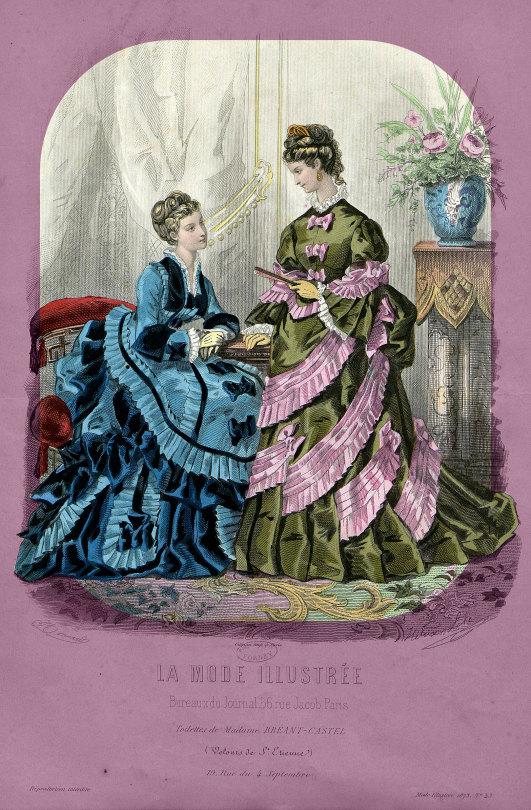
La Mode illustrée, no. 43, 26 octobre 1873, Paris. Toilettes de Madame Bréant-Castel (Velours de St. Etienne) 19, Rue du 4 Septembre. Ville de Paris / Bibliothèque Forney
Description de toilettes:
Jupon en velours de Saint Étienne vert-bleu, très-foncé, garni d'un volant plissé, coupé de distance en distance par des quilles en faye vert-bleu très-clair, traversées par un ruban de velours de la teinte foncée, terminé par un nœud. Tunique de la teinte claire, bordée d'un même volant plissé, sous lequel se trouve un haut volant en velours froncé. Les lés de derrière de la tunique sont relevés par de larges rubanset de grands nœuds en velours de la teinte foncée. Sur le devant de la tunique, nœuds en .même velours; sur les manches et le corsage, revers en velours.
Robe en faye olive, garnie de biais et de ruches en faye rose, disposés en colimaçon; grand pouff, relevé par un nœud rose. Corsage plat, à pointe devant et derrière, garni de nœuds roses, et sur son bord inférieur d'une ruche rose. Manches longues et larges, coupées par une draperie rose.
—
Petticoat in very dark green-blue Saint Etienne velvet, trimmed with a pleated flounce, cut at intervals by pins in very light green-blue faye, crossed by a dark velvet ribbon, finished by a knot. Light-coloured tunic, edged with the same pleated flounce, under which is a high gathered velvet flounce. The back strips of the tunic are enhanced by wide ribbons and large dark velvet bows. On the front of the tunic, knots in the same velvet; on sleeves and bodice, velvet lapels.
Dress in olive faye, trimmed with bias binding and ruches in pink faye, arranged in a spiral; large pouff, enhanced by a pink bow. Flat bodice, peaked in front and behind, trimmed with pink bows, and on its lower edge with a pink ruffle. Long and wide sleeves, cut by a pink drapery.
#La Mode illustrée#19th century#1870s#1873#periodical#fashion#fashion plate#color#retouch#description#Forney#dress#toilette#ensemble#Bréant-Castel#velvet#Saint Etienne#blue#green#bustle#pink#olive#ruffle#bow
107 notes
·
View notes
Text
16 JANVIER 2019
Programme lexico-costaud : on va bosser sur le langage !

Jeu (5-10 minutes) : Ironèmes délibérés. « Vivre au sommeil pour avoir plus chaud » : fabriquer de petites phrases dans lesquelles une homophonie sur un seul mot entraîne une belle aberration logique, puis continuer une mini histoire. Exemple : « Quand le chat n’est pas là, les souris pensent, mais à quoi pensent-elles ? … Et l’histoire continuerait sur quelques lignes. » On fera deux essais, sur les séries suivantes, dans lesquelles on changera un seul mot d’une ou deux lettres en conservant sa sonorité principale : Donneur, honneur, sonneur, bonheur, etc. Couture, bouture, mouture, suture, future, etc. Voici le mot explicatif de l’auteur des ironèmes, Étienne Candel, https://twitter.com/etienne_cdl et le lien vers le site de l’éditeur des rouleaux ironémiques : « Et voilà ! La seconde édition du livre-rouleau des #ironèmes est disponible sur le site de son génial et discret éditeur. Quelque 700 textes à l’encre thermique, à sortir de leur boîte de conserve ! https://ironemes.peuplecache.com »

N.B. Quelques vers de Corneille ont été distribués, au cas où l’honneur serait tentant…
Le sonneur est dans le pré, et il pèse 850 kilos. Il s’appelle Hadrien, c’est un beau charolais au caractère entier, et il règne sur son troupeau de blanches dans les verts pâturages de la Bourgogne. Ce dont il ne s’est jamais rendu compte, c’est qu’il est ridicule avec son énorme clarine qui lui pendouille sous le fanon. Son propriétaire vient du Haut-Doubs, et a trouvé ce moyen pour repérer le troupeau par temps de brouillard.
L’argent ne fait pas le donneur. Il fait plutôt le receveur, celui des Impôts, qui réclame, prend, puis redistribue, mais le malheureux donneur, lui, a toujours l’impression de se faire avoir. Il lui semble même que l’argent défait le donneur. Voilà pourquoi Gaston, donneur contre son gré, a braqué la Recette Départementale, et vidé poignée par poignée le sac de son larcin tout au long de la rue, par-dessus les barrières ou les murets. Quand la Police Nationale, payée par nos impôts, l’a enfin arrêté, il lui restait juste de quoi acquitter sa contravention, parce qu’il avait laissé sa bagnole devant la grille de l’Hôtel des Impôts.
Le chirurgien s’attardait au-delà du nécessaire : la mouture était délicate, il n’était pas bien réveillé. Il reniflait, du bloc, les arômes de la cafétéria, et le Robusta acide qui en émanait lui faisait présager des aigreurs d’estomac. Il termina de recoudre celui de son patient, et attendit le suivant.
Quasimodo était donneur de cloches à Notre-Dame. La belle Esméralda n’avait qu’une misérable monture et un petit panier, et une robe sans poches. Elle fut donc arrêtée par les agents du prévôt, parce qu’elle se promenait avec une cloche non immatriculée sous le bras. Après Esméralda, la cloche fut derechef pendue au clocher de l’église, et elle sonne encore aux oreilles de Victor Hugo pour lui rappeler qu’on n’invente pas n’importe quoi sur une époque qu’on n’a pas connue.
La haute bouture, c’est du luxe. Le brin de géranium à deux feuilles, un bourgeon et 5 euros, sans garantie qu’il se développe correctement dans mon terreau pourri, c’est déjà de l’escroquerie. S’il faut en acheter qui fassent 15 ou 20 centimètres, et avec des boutons prêts à éclore, ça sort de mes moyens. La fleur en plastique, même délavée par plusieurs étés, c’est du solide, et personne ne viendra en couper des petits bouts pour les faire reprendre dans un verre au coin du radiateur. Et pour l’intérêt que ce vieux machin portait aux fleurs véritables, je ne vois pas pourquoi j’irais me ruiner sur sa tombe. Non, mais c’est vrai, quoi !
Précipice élevé d’où tombe mon sonneur ! La chute des corps était ainsi étudiée par Newton, du haut du clocher de l’Université de Cambridge, la petite ville où il fréquentait assidûment les cours de théologie. Il lui fallut assassiner quatre sacristains, en toute impunité, avant de reformuler beaucoup plus tard sa théorie sur les lois de la gravitation. En toute impunité, et comment donc ? Ce rusé gars de la campagne prétendit à chaque fois que le sonneur avait trop bu, ou s’était imprudemment penché, et la mort d’un manant ne fut jamais comptée comme celle d’un anglais à part entière.
Mon sonneur est muet, mon devoir impuissant ! Si la cloche ne retentit pas, c’en est fait de la cérémonie ! Mariage sans cloches, mariage qui cloche. Qu’on aille chercher un remplaçant, et vite !
« Nous n’avons qu’un donneur, il est tant de maîtresses cartes. La partie est truquée. » Au casino de Monaco, James Bond se préparait à déposer un paquet de plaques de cent livres sterling, et il apostropha en ces termes le croupier en redingote. On appela le directeur, il y eut une brève explication et Bond repartit au bras de sa girl du soir. Au petit matin, il quitta l’hôtel et prit la route de la corniche au volant de son Aston Martin, l’œil vif et l’esprit tendu vers sa mission : il avait encore trois espions à démasquer, une demi-douzaine d’hommes de main à abattre, et au moins trois magnums de champagne à vider avant minuit. Quelle vie, tout de même, se dit-il.
Écriture longue (15-20 minutes) pour trois petits récits complémentaires : Transposition par changement de point de vue. On commencera par un premier récit à deux ou trois personnages, vu de l’extérieur par un observateur neutre, puis un deuxième récit avec le point de vue d’un de ces personnages, et un troisième avec le point de vue d’un autre de ces personnages. Petite contrainte : Il doit y avoir contradiction entre deux de ces points de vue. Thème imposé : la galette des rois.
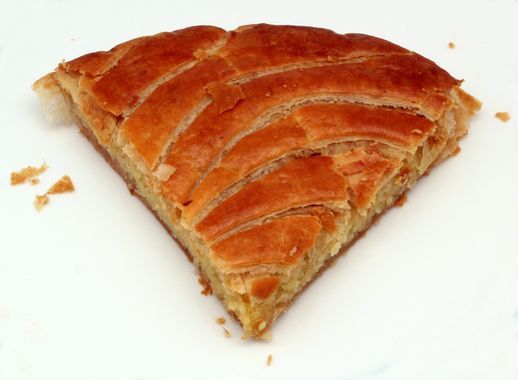
Texte 1. Je leur avais découpé la galette en parts à peu près égales et je les avais laissés avec leur pétillant de pomme et leurs assiettes. C’est Jacques qui a commencé à faire dégénérer la situation, mais je n’ai pas voulu intervenir. Je le voyais pencher la tête, faire tourner le plat à dessert, revenir en arrière, faire le malin, sans doute pour repérer (ou simuler d’avoir trouvé ?) où se cachait la fève. Il a fait son petit bluff, je n’avais pas entendu crisser le couteau contre un quelconque obstacle. Et quand Pierrette a mordu sur la porcelaine, il a crié : « Tu as triché, tu as pris la tranche de Jules, c’est lui qui devait l’avoir ! » Après, ils se sont disputés, ont fouillé les tranches restantes, éparpillé de la frangipane sur toute la table, et c’est moi qui ai nettoyé. Comme toujours.
Texte 2. Je suis tombée sur la fève sans le faire exprès. Je ne voulais pas avoir la couronne, moi. D’abord, parce que c’était pour être roi et moi je suis une reine, ou une princesse. Et c’est Michel qui ‘avait donné sa part parce que la mienne était plus grosse et qu’il est gourmand. C’est pas juste. Et tout le monde s’est moqué de moi en disant que la couronne était trop grande et qu’on allait me couper la tête dans une guillotine. C’est pour ça que j’ai pas fini et que je suis allée pleurer dans ma chambre.
Texte 3. J’avais vu une part plus gonflée que les autres, alors j’ai fait tourner l’assiette plusieurs fois, pour les embrouiller et pour rigoler, en faisant bien attention. Mais j’avais mal repéré la tranche que je voulais. J’avais pourtant tout fait pour avoir la fève en couleurs, celle du roi, et je me suis retrouvé avec une petite reine en plastique blanc entre les dents. Personne ne m’a vu, et je l’ai avalée. Je n’allais tout de même pas avoir l’air débile et me retrouver à être la reine de Michel ou de Jules, et encore moins la reine de Pierrette ! Celle-là, elle est partie chialer dans sa chambre, c’est bien fait pour elle. Et après on s’est tous mis après maman en lui disant qu’elle avait oublié de mettre une deuxième fève dans le gâteau, et elle nous adit que le goûter était terminé et qu’on n’était pas près de recommencer.
À rebours (10-15 minutes) : La chute à l’envers. On suivra ce mode d’emploi original, expérimenté par deux écrivains contemporains. En février ou mars 2012, l’écrivain argentin Eduardo Berti proposa à l’écrivain espagnol Pablo Martín Sánchez d’écrire un livre ensemble à partir d’une idée originale ou, pour le moins, curieuse : EB écrirait une trentaine de commentaires environ d’environ, trente micro-nouvelles inexistantes ; PMS, à partir de ces commentaires, écrirait les micro-nouvelles en question. Puis, lors d’une seconde étape, ce serait l’inverse : EB écrirait des nouvelles également très brèves à partir des comptes rendus anticipés de PMS. […]

Pablo Martín Sánchez Eduardo Berti
Voici un exemple de leur travail à deux plumes. 4. L’anecdote est banale, il faut le reconnaître. Mais l’astuce de la raconter à l’envers, en commençant par la fin, comme un film projeté « à rebours », contredit cette banalité. Elle la dément, pourquoi pas, en nous montrant à contre-jour, d’un point de vue nouveau, quelque chose qui avait perdu tout effet de surprise à nos yeux. Fondu au noir Il finit de traverser la rue et respire, soulagé. Ses derniers pas ont été les plus angoissants. Un moment, à mi-chemin, il a cru qu’il n’y arriverait pas. Et pourtant il s’était lancé d’un pas décidé, en pensant aux mots du poète : « On ne voit bien qu’avec le cœur, l’essentiel est invisible aux yeux ». Maintenant il se réjouit d’avoir jeté sa canne avant de traverser. Comme ça, personne ne pourra dire que si les voitures l’ont évité, c’était pour ne pas écraser un aveugle. Traduit de l’espagnol par Jean-Marie Saint-Lu
On partira donc de ce principe : Chacun écrit, en 5 ou 6 lignes, le commentaire d’une micro-nouvelle, sur une feuille libre, et la passe ensuite à son voisin, qui écrit la micro-nouvelle qu’il croit correspondre à ce commentaire. Ensuite, on passe au voisin, qui lit successivement le commentaire et la nouvelle… Voici les résultats de cette ronde.
1. (Ch.) Il faut une culture certaine pour comprendre l’histoire. Les métaphores ne sont pas accessibles à tous, et l’usage du subjonctif donne un air désuet à cet événement inattendu. A. (B.) Les réchauds fumaient, l’antre résonnait des halètements de Nicolas. Il n’eût point fallu que le queux du sorcier usât de sulfure dans son athanor, et conséquemment le brouet ne se fût aucunement transmuté en pis. C’est le gosier tout esquinancié que le pauvret Gaspard avala son potage, sous l’œil esbaudi des suivantes, puis rendit sa gorge à longs bouillons, et resta bien marri et toujours prince, déconfit que la métamorphose eût échoué. Le royaume des grenouilles attendit, attendit, et la Rainette replongea au marigot. Nicolas Flamel se vit interdit de paillasse, de marmite et de cheminée et nul ne parvint plus jamais à réaliser qu’un humain devînt crapaud, quand la réciproque était si fréquente dans les bons contes d’antan.
2 (B.) Le choix de situer le récit dans un futur indéterminé permet au personnage principal d’énoncer des opinions très politiquement incorrectes, et justifie – au contraire – son élimination finale et grotesque. B (Si.) Jacques habitait non loin du « rond-point » devenu le centre de ralliement de sa corporation. Ses collègues étaient là tous les soirs, après le travail, et refaisaient le monde autour d’un foyer improvisé et chaleureux. Tous ces ouvriers étaient là pour protester contre le coût de la vie, les salaires insuffisants, la hausse des impôts, mais avaient réussi à établir une vraie relation, tenace, mais tranquille. Il leur arrivait parfois de chanter, de raconter des blagues, de danser.Jacques, lui, arrivait les mains dans les poches, l’air faussement décontracté. Tout de suite il commentait les faits du jour, et interpellait les copains sur des sujets brûlants. Il s’emportait contre les élus locaux, les personnalités politiques, et finissait par injurier ceux qui ne pensaient pas comme lui. Excédé, Jean, qui était le plus vieux, et qui avait fédéré toutes les revendications d’une manière ferme mais douce, lui demanda de partir pour ne plus revenir.
3 (Si.) L’auteur a bien voulu nous faire partager une fête de famille qui s’est mal terminée, parce que trop arrosée. On notera que les personnages qui jouaient aux cartes dans la maison étaient tous membres de la même famille. C (Co.) Tu joues ? C’est ton tour. Pierre, apporte donc la bouteille de poire ! On a déjà les verres, ou les tasses feront l’affaire. Bon alors, mon cher frère, tu fais quoi ? Tu rêves ? Il faut miser maintenant. – C’est pas parce que c’est l’anniversaire de maman que tu dois boire autant. En plus cette partie de cartes est nulle. Tu fais n’importe quoi ! Réfléchis un peu, compte les plis ! – Laisse-moi tranquille, toi ! Je ne t’ai rien demandé, le binoclard. Jacques jette ses cartes sur la table, recule brusquement sa chaise qui se renverse. Françoise pousse un cri, Solange surprise renverse la cafetière, Pierre lève les bras au ciel, tandis que jacques se jette sur André. Dans cette bousculade, personne ne voyait les larmes de leur mère.
4. (Co.) Une histoire simple, bucolique, mais racontée avec un style rythmé. Les mots nous entraînent, les mots nous font sentir, entendre. Une belle ballade, vraiment. D. (Or.) L’amour est dans le pré, Premier épisode, Saison 9. Il se souvint du premier jour de son amour ; il n’était que patience, tendresse et attention. Sa main entoure celle de l’aimée qui chantonne. Sa voix glougloute comme celle du ruisseau qui les accompagne. C’était à la saison 2, croit-il, qu’il commença à en avoir assez des glouglou, des p’tites fleurs et des p’tits oiseaux. Du vent caressant les herbes hautes. Du soleil chauffant la peau à bloc ; du désir qui de plus en plus se pressait en lui. La saison suivante vit éclore de mauvaises pensées dans cette tête blonde que la belle adorait. Il la voit s’étendre en souriant. Les herbes se couchent révélant leur ardeur fraîche. Elle sourit et l’attire. Il tente d’effacer l’image. Mère ne tolérerait pas qu’il cède au feu bouillonnant en lui. Père déciderait son bannissement, et Dieu lui donnerait raison. Il respire longuement, se calme. Les saisons suivantes ont eu raison de cette abnégation. Et c’est dans un grand désarroi qu’il décidera au cours de la neuvième saisons de …
5. (Or.) Je n’ai pas bien compris pourquoi il fallait autant de courage pour obtenir finalement un résultat si convenu. Quelque chose m’aura sans doute échappé. E. (A.) L’homme n’écoutant que son courage se déshabilla avant de se précipiter vers l’eau glacée. Il commença par y tremper le bout de son pied gauche puis entra résolument dans l’eau jusqu’aux chevilles. Avisant alors une branche morte emportée par le courant il s’en empara et réussit en s’enfonçant jusqu’à mi-mollet à intercepter le ballon des enfants qui jouaient en amont. Il reçut de leur part de touchants et chaleureux applaudissements. Il en faut peu pour être héros.
6. (A.) Cette histoire apparemment sans queue ni tête qui trouve tout son sens à la dernière phrase est assez originale même si l’anecdote en elle-même est plutôt quelconque. F (Ch.) L’escalier automatique du métro Barbès était une nouvelle fois en panne. Alors, bien sûr, ceux qui montaient pestaient. On entendant des « Y en a marre », « Dire qu’on paie nos tickets » et autres amabilité déplaisantes, parfois grossières. Ceux qui descendaient par ledit escalier n’auraient pas dû l’emprunter. Ils le savaient, mais pour eux, contrairement aux « montants », l’avantage était qu’ils gagnaient quelques secondes en prenant ce raccourci en sens interdit. Bref, tous allaient dans tous les sens et cela n’aurait eu ni queue ni tête si brutalement la machine ne s’était remise en route. La première personne qui chut entraîna les autres comme dans un jeu de dominos. Un tas de bras et de jambes mêlés créa une sorte d’hydre à mille pattes. Un heureux photographe saisit la scène et l’envoya à Paris-Match. Sans lui, sauf les pauvres échoués plus ou moins éclopés, qui se souviendrait de cette histoire ?
Démarreur en six mots (5-10 minutes) : Un arrêt surprise. « Parfois, je me dis : “ Et si ... ? ” » On continuera cette phrase (proposée par “De circonstance”) sur six lignes.

Parfois je me dis : « Et si j’arrêtais de venir à cet atelier d’écriture ? Le monde s’arrêterait-il ? Les autres participants continueraient-ils sans moi ? Que deviendraient tous mes efforts pour tenter de gérer mon stress devant la page blanche, que ferais-je désormais ? » Alors je prends une feuille et un crayon, et j’écris des bêtises, ce qui me passe par la tête. Et je m’aperçois que cela ne change guère de mes exercices usuels. La situation est désespérée. Il faut que je trouve quelque chose à lire.
0 notes
Text
PSG diz que Neymar só voltará aos gramados em 2021

O Paris Saint-Germain anunciou neste sábado, 19, que o atacante Neymar, que sofreu uma torção no tornozelo esquerdo no último domingo, 13, ficará fora dos dois últimos jogos da equipe em 2020 e voltará aos gramados apenas no ano que vem. Em um comunicado, o PSG informou que o camisa 10 vem passando por tratamento no centro de treinamentos do clube e não poderá enfrentar o Lille, amanhã, nem o Strasbourg, na próxima quarta-feira. O retorno deverá acontecer em 6 de janeiro, contra o Saint-Étienne.
Leia também

Neymar grava vídeo para garoto de 11 anos que sofreu injúria racial

Messi recebe prêmio por jogo limpo em campo e iniciativas sociais

Raí aceita convite de Casares e ficará no São Paulo até o fim da temporada
Neymar sofreu uma entrada dura do volante Thiago Mendes, do Lyon, durante a derrota do time parisiense por 1 a 0 no Parc des Princes, no último fim de semana, que deixou os comandados do técnico Thomas Tuchel em segundo lugar no Francês, com 31 pontos. O Lille lidera, com 32. Na Liga dos Campeões, o PSG passou aperto, mas garantiu a classificação e a primeira colocação do Grupo H, com 12 pontos. Na próxima fase, os franceses enfrentarão o Barcelona em confrontos marcados para os dias 16 de fevereiro e 10 de março de 2021.
*Com informações da EFE
The post PSG diz que Neymar só voltará aos gramados em 2021 first appeared on Esporte no Mundo.
from WordPress https://ift.tt/3nyUcgF via IFTTT
0 notes